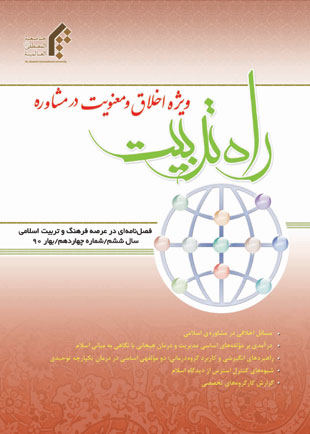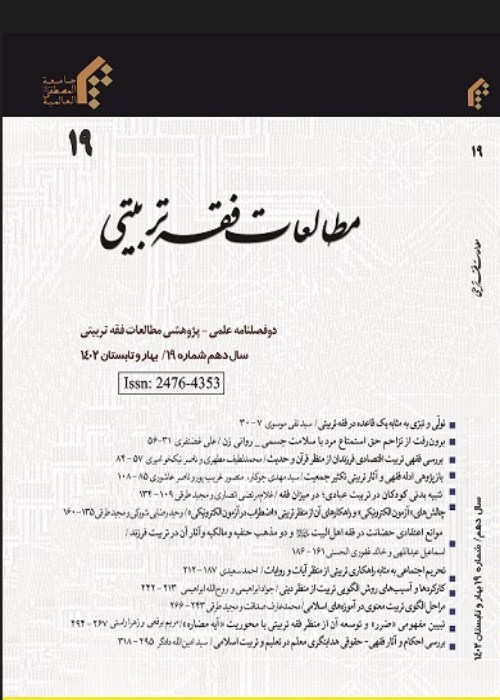فهرست مطالب

مجله مطالعات فقه تربیتی
سال ششم شماره 14 (بهار 1390)
- ویژه ی اخلاق و معنویت در مشاوره
- تاریخ انتشار: 1390/09/20
- تعداد عناوین: 13
-
صفحه 9
- مقالات
-
صفحه 15
-
صفحه 111
- گزارش
-
صفحه 143
-
صفحه 159
-
صفحه 167
-
صفحه 173
-
صفحه 191
-
Page 15The present study is seeking to state those moral issues that should be observed by an Islamic consultant in his counseling and therapy. These issues have been discussed in three sections: the consultant himself, the client, and other experts and colleagues. Moral issues pertaining to the consultant himself/ herself, which are 11 in number, refer to those issues to be considered prior to the consultant's entering the sphere of counseling and therapy; this is somehow the prerequisite for his designation and survival in this sphere. In the section on moral issues pertaining to the client, which is the most important part of the counseling relations, 30 moral issues have been discussed. Finally, 11 moral issues of the consultant and psychotherapist, pertaining to the experts and colleagues, have been mentioned.
-
Page 47Human beings face many events and incidents in their life, over which they overcome using their internal forces endowed by God. The human's internal force makes their life dynamic and causes movement and growth. It is the basis for many of human behaviors and insights. On the whole, it can be said that this force is the very force of human emotions. Emotions are a level of affections with a special strength, length and direction; they affect the individual's behaviors directly. Emotions are uncontrollable affective storms that act independently. Thus, managing them is important for self-control and directing one's behaviors. Therefore, this research presents a comprehensive definition of motivation and emotion along with a precise scientific explanation, while dealing with different emotional levels of affections, constituents and parameters of analyzing the effect of emotion on behavior, and separating various types of emotions, and the difference or similarity of dealing with them. In another section, the difficulties of controlling emotion, the method of emotional- rational therapy, the relationship between emotion and physiology, and the relationship between emotional disorders and identity disorders are scientifically scrutinized. In the final section, it has dealt with moral-emotional characteristics in Islam and, to research more, makes mention of relationship of emotions with legal and moral laws of family.
-
Page 71Integral Monotheistic Therapy is a newly-found therapeutic method based on monotheistic teachings of Islam; it is a psychological theory and a new therapeutic method, which is growing out from a technique called monotheistic therapy with its 30-years long background. This approach integrates different psychotherapeutic theories and techniques – especially the humanistic and existentialist methods, cognitive therapy, analytical techniques, teaching living skills, practicing the efficient confrontation methods, and other therapeutic techniques – and combines them into monotheistic-spiritual teachings of Islam. In this way, it tries to direct the client toward recognizing and accepting his/her true and divine 'self' by creating an intimate relationship with God. The present research is introducing this new model to be used in scientific and therapeutic centers. This therapeutic method has different stages and is among the long-term therapies. Since the 'motivation' in the first stage, and 'group therapy' in the final stage, are two parameters and the effective standards introduced, consultant and therapist in Integral Monotheistic Therapy these two parameters are dealt with in detail. The writer uses his years of experience and his continuous relationship with authors3 of this method as well as cooperation4 in formulation of this model to introduce it and its two basic therapeutic parameters in three sections. The following key terms have played the greatest role in consulting and curing the clients: Integral Monotheistic Therapy, group therapy, spiritual and religious parameters, therapy motivation. Thus, in the first part of the article, the Integral Monotheistic Therapy model has been introduced. In the second part, the motivational principles of the clients have been discussed, and in the thirdpart, the most important element of therapy in this approach, i.e. the group therapy, have been dealt with.
-
Page 111Stress, or psychological pressure, which leads to tension and unhappiness in human, erupts more or less in all human beings. Accordingly, various views have presented some techniques for preventing and curing it. These can be effective in reducing or controlling stress. Islam also has presented some techniques based on its own parameters and methods of psychological education. One of the original Islamic principles for overcoming mental stresses is paying attention to monotheistic culture. In Islam, the actions and characters of monotheist persons have a certain, predefined and controllable structure; that is, all their instincts, sensual tendencies, and volitional behaviors are controllable according to the divine rules. This care and control is formed in an organized frame,using different cognitive, behavioral, and affective-spiritual methods for facing with tensions and adapting to difficulties. Thus, in the present article, we have tried to define and explain stress according to Islamic bases; then, we will study Islamic techniques for preventing and facing with stress in three sections entitled 'cognitive methods', behavioral methods', and 'affective-spiritual' method. By cognitive methods, we mean those methods pertaining to the individual's cognition, thoughts and beliefs; in the first section of the article, we have dealt with this in detail. In the second section, we will discuss the behavioral methods, practical instructions and recommendations, such as the manners of mutual interaction and their effect on facing with difficulties. The third section has been devoted to the individual's affective-spiritual methods (i.e. his worships), which is a kind of affective relationship with God and religious leaders, and leads to strengthening the possibility of facing with difficulties and solving them.


